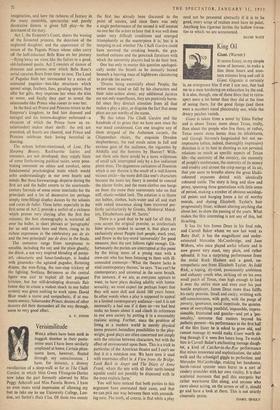Verisimilitude
WHILE others have been sunk in hoggish slumber in their panto- mime seats I have been similarly employed at home. Certain phan- tasms have, however, floated through my consciousness, I have, for instance, a drowsy recollection of a sleep-walk as far as The Chalk Garden, in which Miss Gwen Ffrangcon-Davies now takes the part formerly adorned by Miss Peggy Ashcroft and Miss Pamela Brown. I have an even more vivid impression of allowing my feet to take me to see University College, Lon- don, act Sartre's Iiitis Clos. Of these two events
the first has already been discussed to the point of nausea, and since there was only a single performance of the second it will interest no one but the actors to hear that it was well done under very difficult conditions and emerged triumphantly as the masterpiece it is*,' but it is
tempting to ask whether The Chalk Garden could have survived the creaking boards, the gap-
toothed curtains and the gimcrack furniture with which the university players had to do their best. One has only to mutter this question apologeti- cally under the breath to be instantly buried beneath a heaving mass of highbrows clamouring to provide the answer : 'Drama being essentially about People, the writer must stand or fall by his characters and
their inter-action alone; any additional factices are not only superfluous, they are positively harm- ful since they distract attention from all that makes a play a play, or disguise the fact that some plays are not worthy of the name.
'By this token The Chalk Garden and the hundreds of its genre that we have seen since the war stand condemned. Can one imagine any of them stripped of the Aubusson carpets, the Chippendale chairs, the exquisite Dresden shepherdesses, the real meals eaten in full and envious gaze of the audience, the cigarettes by Abdulla and the hoovers by Hoover? With- out these aids there would be a mere wilderness of small talk interrupted only by a few indiscreet pistol shots. The degenerate caricature of Ibsenism which is our theatre is the result of a well-known vicious circle—the more doll-like one's characters become the more toy finery is needed to conceal the plaster limbs, and the more clothes one hangs on them the more their movements take on that stiff, elastic-welded look. The solution is to throw out babies, clothes, bath-water and all and start with naked innocence along lines traversed per- fectly satisfactorily by Greeks, Mediaeval Moral- ists, Elizabethans and M. Sartre.'
There is a good deal to be said for all this. If tyou accept the original premise, as intellectuals tiain always tended to accept it, that plays are exclusively about People (not people, mark you), and throw in the key-word 'universality' for good measure, then the rest follows right enough. Un- fortunately the purists are interrupted at this point by the biting tones of a young man with a crew-cut who has been listening to them with ill- concealed contempt—'What the theatre lacks is vital contemporary themes,' he says. `You can't be contemporary .and universal in the same breath. For instance, if we are, as everyone appears to want, to have plays dealing adultly with homo- sexuality, we must expect (or perhaps hope) that they will seem dull and dated 100 years hence. In other words when a play is supposed to appeal to a limited contemporary audience—and it is not necessarily a bad one if it does so—we had best make no bones about it and clinch its references to our own society by putting it in a reasonably realistic setting. Further, since the problem of living in a modern world in merely physical terms presents boundless possibilities to the play- wright, good plays are often concerned not simply with the relation between characters, but with the effect of environment upon them. This is a trick in particular of the American theatre and I can't see that it is a mistaken one. We have seen it used with enormous effect in A View from the Bridge, 'Look Back in Anger and The Diary of Anne Frank, where the sets with all their earth-bound squalor could not possibly be dispensed with in the most realistic form.'
You will have noticed that both parties to this argument have overstated their cases, and that we can pick our way between them with astonish- ing ease. The truth, of course, is that while a play need not be presented abstractly if it is to be good, every scrap of realism must have its point. Anything less rigorous invites the hollow traves- ties to which we are accustomed.
DAVID WATT


































 Previous page
Previous page